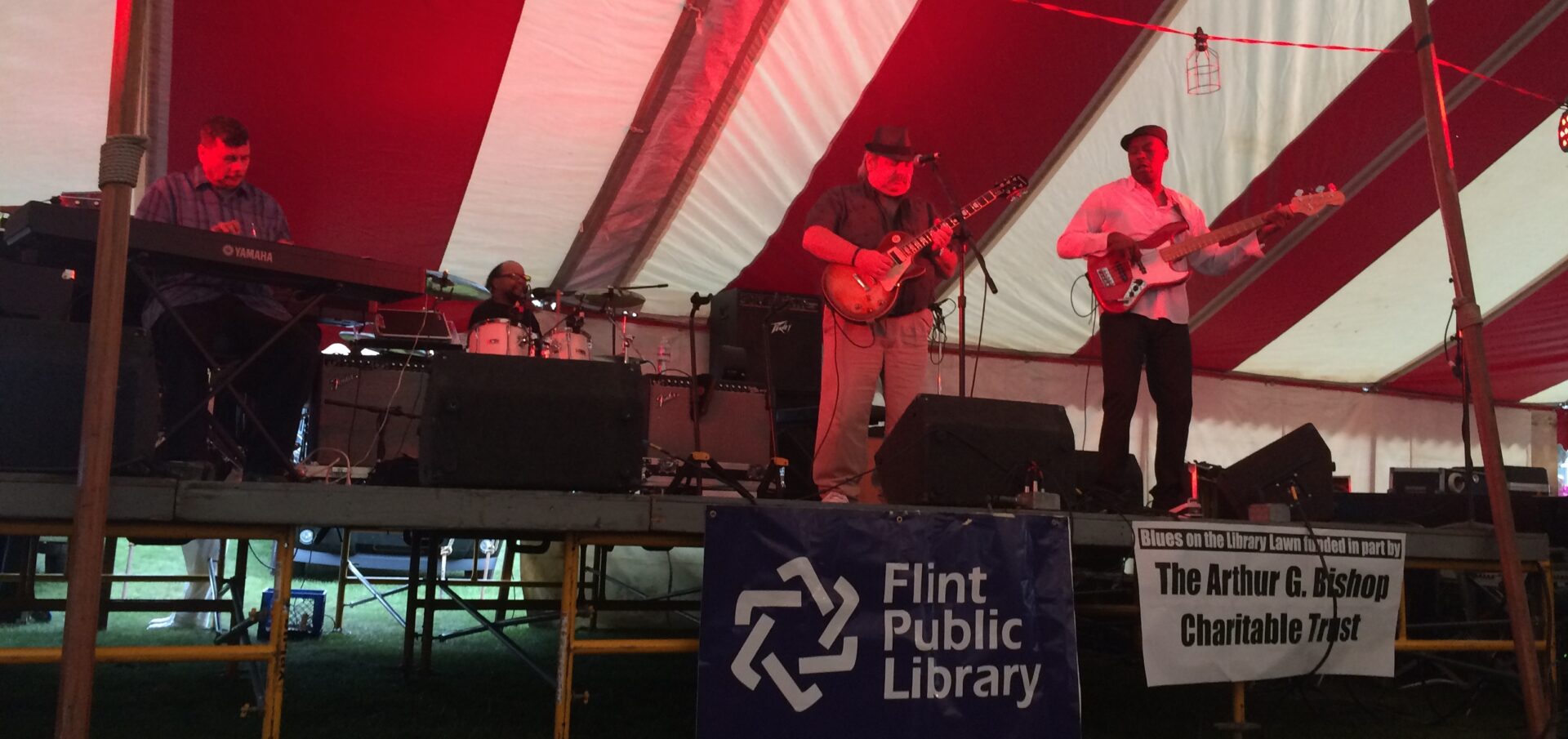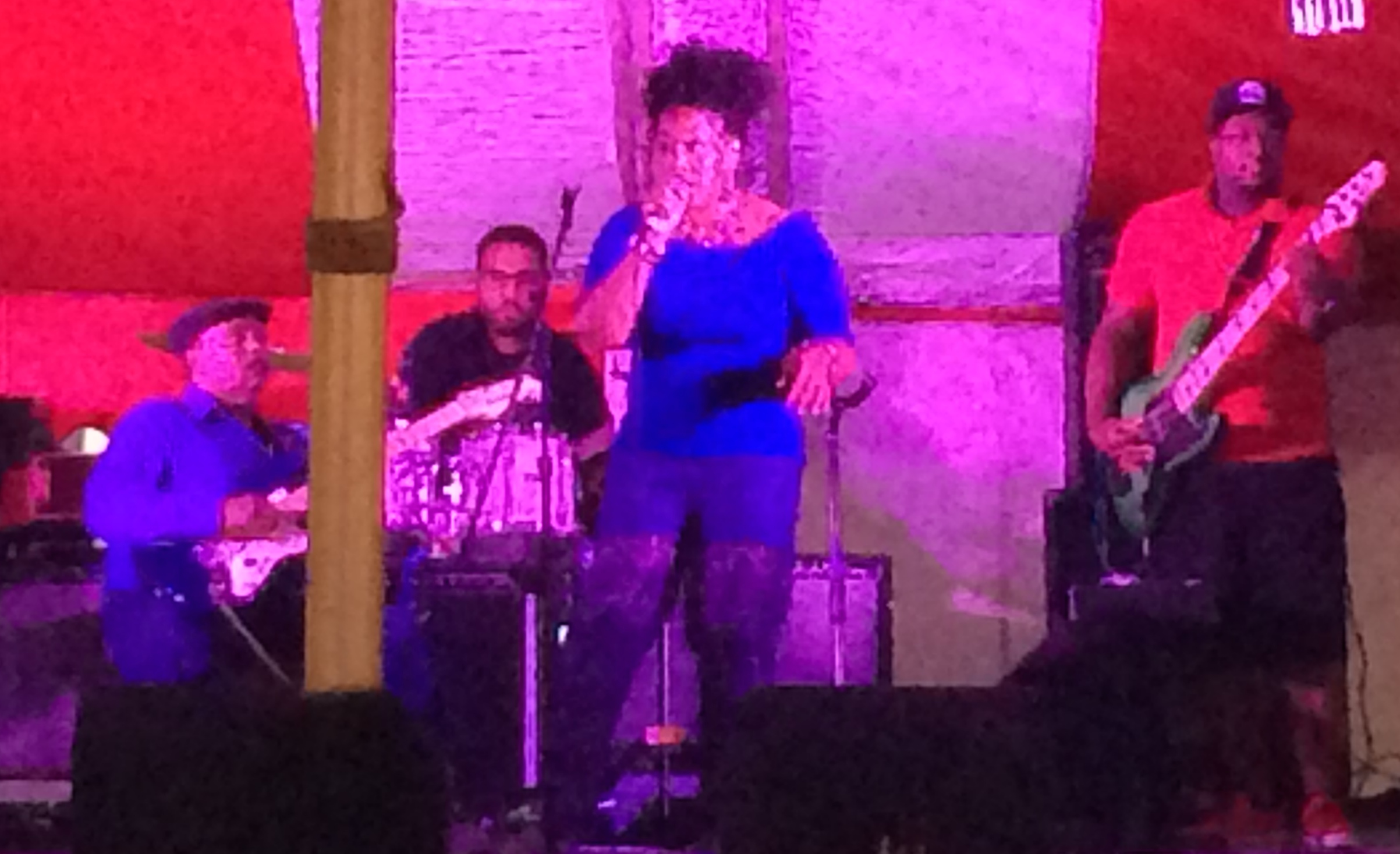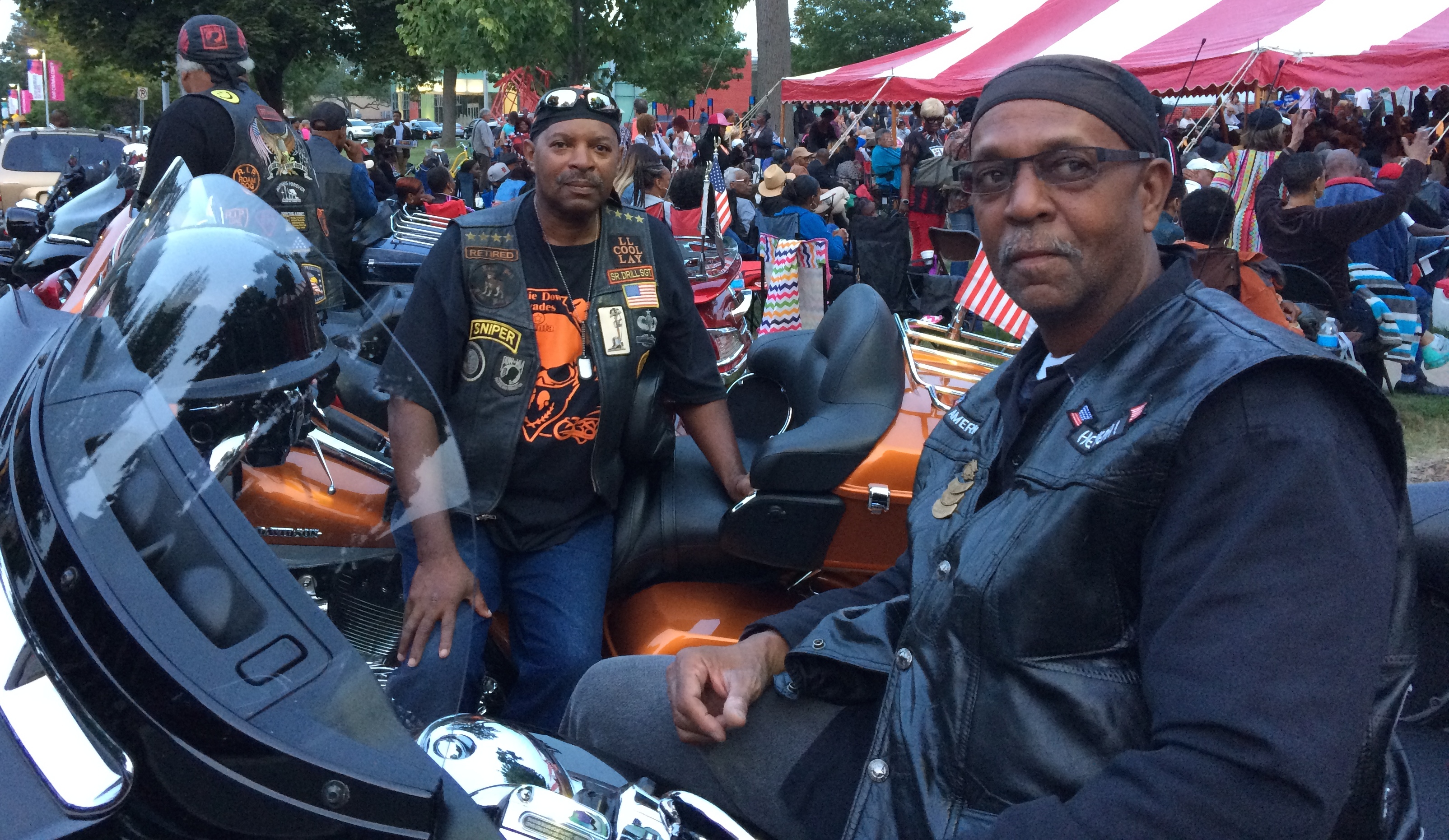By Sherrema Bower
For the performers of the eighth annual Flint Blues Festival on the lawn of the Flint Public Library Aug. 26, having a sense of connectedness to others and home was a common theme. The performance line-up, organized and headlined by Flint blues guitarist and singer Maurice Davis, brought out a “Who’s Who” of local Flint blues artists.

Greg Ellis Blues Band kicked off the evening (Photo by Jan Worth-Nelson)
Featured at the festival were the Greg Ellis Blues Band, Grace Thomas, Nikell Johnson, Napoleon Demps, and deejay Walt Love along with headliner Davis.
Wanda Harden, community engagement and communications manager at the Flint Public Library, said when the Flint Blues Festival began, it was in partnership with radio station 98.9 WOWE. The original organizer of the blues festival, then-Director of Library Services, Jo Anne Mondowney, loved blues and jazz and enjoyed presenting live music at the library. Mondowney approached Davis and the Flint Blues Festival was born. This year’s festival also was sponsored by the Arthur G. Bishop Charitable Trust.
“Maurice is a staple,” Harden said, and explained that this year, Davis organized the lineup of performers.
Grace Thomas: “I would sing to the stars”
After a rousing performance of “Proud Mary,” Flint singer Grace Thomas sat for a post-performance interview. Speaking of her southern roots and her background in creative dance, Thomas said she began singing after she moved north to Flint with her young son in 1978.
She said her uncle, Len Bland, asked her to open for his band and that was the start. Now, nearly 40 years later, Thomas has traveled to sing at clubs and jazz and blues festivals in all three countries of North America and others, including China and France. She said that one particular experience abroad, that of singing in a Beijing night club for two months, was impactful because of the ways she connected with R&B, blues, and jazz singers from other countries.
“They love R&B in China,” Thomas said, “and the singers I was with at this club were all from different countries. Even though none of them could speak English, we did a rendition of ‘I Will Survive’ together.”
That kind of deep connection around music and song characterizes Thomas’s approach to her craft. She said that as a girl growing up in Mississippi where she lived with her father, she would go outside at night. “In the rural south at night,” she said, “the stars look really close. I would sing to the stars, I would sing to God. Neither of my parents was musical, so even now I consider my singing a gift that I give back to God. Although I never ‘made it,’ per se, I still feel successful because I have to sing.”
Nikell Johnson: “Bring back 90s R&B”

Nikell Johnson (Photo by Jan Worth-Nelson)
When newcomer Nikell Johnson took the stage, she looked stunning in a royal blue off the shoulder blouse and embroidered lace pants of the same color. It was an outfit, she said in a post-performance interview, that she had made herself so that she knew it was an original. A Flint native, Johnson said that until 2017, she sang backup for several local groups and the Flint Blues Festival was among her first solo performances. It was clear that the crowd enjoyed her.
But it has taken awhile to get to this point, she said. Having auditioned twice with American Idol and earlier this year with The Voice, she sees herself finally emerging as a solo artist. She said she draws inspiration from the older R&B artists, such as Anita Baker and Sade. Chuckling, she said, “Hash tag, bring back nineties R&B.”
Johnson said she is scheduled to play Churchill’s in downtown Flint Sept. 30 and expects to release her new hit single, “Going Out, Southern Soul with a Twist,” (with Fli Boy Music) Sept. 15. Johnson’s colleague, singer Napoleon Demps, who shares her label on Fli Boy Music with producer Floyd Fuller, said that what he sings is Southern Soul, a mixture of blues, R&B, and hip hop.
Johnson and Demps both said they have been singing from early childhood in their church gospel choirs. Demps said he began singing as a middle schooler at Flint’s Southwestern Academy and credited his parents as his inspiration. He said he and his dad together had emptied their bank accounts to bring guitarist Jody Sticker to Flint, to record a ten-song album with Demps.
A local theatre performer with Flint’s New McCree Theater, Demps also has had some professional success in southern states like Texas and Mississippi. He said, “I try to make people feel engaged in what I do. I try to maintain my faith in God and a level of humility that helps keep me grounded.”
Maurice Davis: a spiritual connection with music
Headliner Davis echoed the belief that his skill in playing and singing the blues was a spiritual connection. A native of north Flint, Davis said that he began playing the guitar while in junior high at Holmes Middle School (now Holmes STEM Academy). He said that his inspiration was the late B.B. King because King had “a lot of power; he commanded attention.”
Learning how to play like the legend himself earned Davis the nickname of “Little B.B. King” during high school, when he played guitar with his group, Hunt’s Determination Band. “We were an R&B band,” he said, “but I would still come out and do a blues solo, which, by the way, would tear the house down.”
His craft would take him onward to sing and play with many of the blues legends, including Buddy Guy, Bobby Bland, and Johnnie Taylor, but alas, never with his inspiration and mentor-from-afar, B.B. King. He said that although he and King played with many of the same artists and he attended King’s concerts and even stayed at his house once in Las Vegas (although King was absent), because they never personally met, Davis was unable to tell the man how he had inspired him.
Although Davis, a former factory worker with 10 years seniority at Chevrolet in Flint (he worked at “Chevy in the Hole” — Fisher One), has recorded 18 CDs over the course of his career.
He is adamant that his first love is being home in Flint.
“No matter what I do, I’ll never be too big to do [the Flint Blues Festival with the Flint Public Library]. We’re under all of these conditions in Flint, so I get to take people out of their misery for a few minutes because that’s what it does for me. Success is being free,” Davis said.
Looking around at the many others sitting nearby in lawn chairs, enjoying the music, Davis continued, “We have people sitting around, laid back, all races and ethnicities.” Later, as everyone danced to the Maurice Davis Band’s blues rendition of, among other songs, “Diamond in the Back,” by Curtis Mayfield, it was clear that when Davis is home in Flint among friends, playing and singing the blues, he is doing what he was born to do.
The music tells a story “and it’s my story, too”

People of all ages found themselves dancing (Photo by Jan Worth-Nelson)
Members of the audience thought so too. When asked what brought her to the event that evening, Flint resident Alfreda Jupree immediately said, “Maurice.” She explained that she had attended the Flint Blues Festival the previous four or five years, and what she loved about Davis’s music, indeed, the blues in general, was that “the music tells a story that you can connect with. I like Country and Western music as well as the blues, because [the singers] are telling their story and it’s my story too.”
Jupree said she also enjoys the venue of the Flint Public Library lawn. “We’re outside, there’s no drama, and it’s all grown folk.”
Honest confessions from the soul
East Village resident Herbert Stone agreed. Riding by on his bicycle, he said he had “heard a fantastic sound, the sound of the blues,” so he stopped to stay and listen.
“Honest confessions from the soul,” Stone said. “That’s what the blues are about.” He shared that he was just a boy when he and his parents were one of the first black families to integrate the East Village neighborhood in Flint where he grew up, and that he would often visit the founder of East Village Magazine, Gary Custer, at his office. Since those days, he said, he had become a “connoisseur of music.”
A father’s influence
East Village resident Donna Ullrich also spoke of her dad’s inspiration to her love of music and why she was there at her first Flint Blues Festival. She said that she tries to support a variety of things happening in Flint, especially events that the Flint Public Library puts on. Ullrich said her father had been a musician who hoped that all of his children would follow in his footsteps, although only one of her siblings had done so. Still, each had found their own “instrument” and Ullrich said that hers was a typewriter. Ullrich said that and when she discovered her love of writing that became her art. Now a published author, Ullrich said that finding ways to support other artists in her beloved home of Flint inspires her.

“L.L. Cool Lay” and Roland Stanley, bikers at the blues (Photo by Jan Worth-Nelson)
Bikers for the blues
Not far away, lined up along the curb all waxed and washed, were several gleaming motorcycles with riders dressed up in their leathers. One, whose handle was L.L. Cool Lay of the Boogie Down Motorcycle Club, sat on his bike between Rolande Stanley and Al Smith, both of whom were independent riders. All were from Flint and had ridden their motorcycles down for what they called “Bikes and Blues,” to come out and listen to some great music, they said.
Golden Leaf’s Lottie Reid connects the blues with history
Inside under the tent sat Lottie Reid, owner and manager of the venerable Golden Leaf Club on Harrison Street in Flint.
Listening to good blues is nothing new for Reid, who has been the owner of the Golden Leaf since 1992, and just like the blues, where every song has a story, so does the Golden Leaf. Flint’s first black-owned club, the Golden Leaf was founded in 1921.
“At the Golden Leaf, we’re like Cheers, where everybody knows your name,” Reed said, smiling. “We talk about everything and try not to argue about much.”
Reid said in the days of the old IMA Auditorium, it was whites-only performances from 8 p.m. to midnight, and then blacks from 1 a.m. to 4 a.m.
In that era, the Golden Leaf, Flint’s first black-owned club, garnered such visiting greats as Nat King Cole, Duke Ellington, and Lionel Hampton. Even Malcolm Little (later to become known as Malcolm X), who lived only a few blocks away, often frequented the club.
Local deejay Walt Love spun tunes between each act. A deejay in the early years of WDZZ 92.7 during the late 1970s, before branching out on his own in Flint and Detroit, Love said he is now based back in Flint and excited to be part of the blues festival.

The audience for the blues spilled out beyond the tent to Kearsley Street (Photo by Jan Worth-Nelson)
In summary, the Eighth Annual Flint Blues Festival was a success. A crowd came out and there was a jubilant feeling in the air. Listening to some of the city’s local blues, jazz, and R&B artists can have that effect on a lovely August evening on the Flint Public Library lawn.
EVM staff writer Sherrema Bower can be reached at sherremabower@gmail.com.



You must be logged in to post a comment.